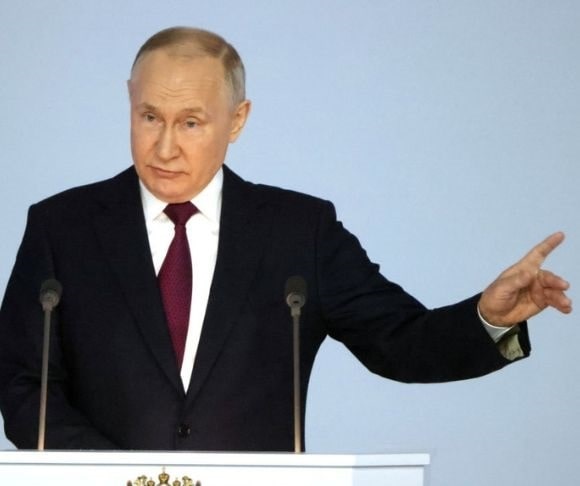Threatening nuclear engagement has been the hallmark of Russian President Vladimir Putin’s geopolitical repartee with the West. So, it should be no surprise that on Feb. 21, in a 100-minute speech to the Russian parliament, he pulled out of the New START agreement.
The issue now is what to do about the withdrawal. The question becomes more critical because the Biden administration is in charge of the US answer. The 2011 New START agreement was important because it enhanced “US national security by placing verifiable limits on all Russian deployed intercontinental-range nuclear weapons.” This was helpful as a platform for weapons-reduction talks, even though it was more symbolic than substantive.
From Putin’s perspective, he has nothing to lose by ditching the New START; from a messaging point of view, he has a lot to gain. He is using the West’s support of Ukraine as a pretext for leaving the agreement and raising a concern resonating with China and his other allies, North Korea and Iran.
Putin Leaving New START Irresponsible
Putin accused the United States for being directly responsible for strikes on “strategic air bases” inside Russia. “I am forced to announce today that Russia is suspending its participation in the strategic offensive arms treaty,” Putin declared. So, where does that leave the United States? In remarks to the press during his visit to Greece, Secretary of State Antony Blinken declared:
“The announcement by Russia that it’s suspending participation in New START is deeply unfortunate and irresponsible. We’ll be watching carefully to see what Russia actually does. We’ll, of course, make sure that in any event we are postured appropriately for the security of our own country and that of our allies … But this decision, as I said, is both really unfortunate and very irresponsible, but we’ll be watching it closely.”
Blinken’s statement signals the national security team will be “watching carefully” and “closely.” If nothing else, the administration’s foreign policy is predictable. We will monitor with no demonstrable willingness to take action. It might have been more assuring to hear this response to the Kremlin: “You want to withdraw from a treaty making the reduction of nuclear weapons a goal for both the US and Russia? Okay, game on.” As is perfectly apparent, that is never Biden’s preferred approach. What the world has seen from the White House is a strategy of opposing an adversary’s strength with overwhelming weakness.

Vladimir Putin (Photo by Contributor/Getty Images)
“Russian President Vladimir Putin delivered a stark warning Tuesday (Feb. 21) that he would be suspending his nation’s participation in a nuclear arms treaty, threatening to resume testing of nuclear weapons,” Timothy H.J. Nerozzi reported for Fox News. The Kremlin’s resumption of nuclear testing would be a sea change in deterrence. While Putin was threatening the West, President Joe Biden was speaking to the people of Poland after his trip to Kyiv, Ukraine. Though the commander-in-chief had strong words that the Polish and Ukrainian audience wanted to hear, he made no mention of Putin ditching the New START or the warning he might resume atomic weapons testing. If Putin makes good on his threat, the calculus between NATO and Moscow changes dramatically. But Biden avoided mention of the danger.
Russia Abandoning Treaty Should Jump-Start US Nuclear Modernization
While the US military has been slow to modernize its nuclear capability, Russia has begun a program to refurbish, renovate, and replace aging atomic weapons with new capabilities. As Liberty Nation explained, “The Kremlin’s nuclear capability and threat to use it largely depends on a nuclear modernization program roughly 80% completed.” Furthermore, regarding the US nuclear modernization, “[N]one of these modernization programs will be fully operational until the end of this decade. There is an existential nuclear peril now.” The United States appears to have adopted the strategy of hoping adversaries will respond positively to diplomatic olive branches. The Department of Defense would do well to advance the timeframe for fielding the new B-21 Raider bomber, advancing follow-on ICBM Ground-Based Strategic Deterrent, and propelling a leading-edge Nuclear Command, Control, and Communications (NC3) system. Game on.
The views expressed are those of the author and not of any other affiliation.




